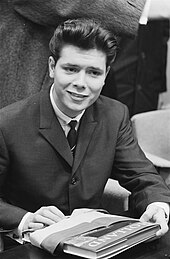Serious Charge: Difference between revisions
m →Cast: link to Liliane Brousse on French Wikipedia |
m →Cast: link to Liliane Brousse on French Wikipedia |
||
| Line 50: | Line 50: | ||
* George Roderick as Fishmonger |
* George Roderick as Fishmonger |
||
* [[Cliff Richard]] as Curley Thompson |
* [[Cliff Richard]] as Curley Thompson |
||
* [ |
* [[:fr:Liliane Brousse]] as Michelle |
||
* [[Wilfred Pickles]] as Chairman of the court [uncredited] |
* [[Wilfred Pickles]] as Chairman of the court [uncredited] |
||
Revision as of 14:47, 23 February 2019
| Serious Charge | |
|---|---|
 | |
| Directed by | Terence Young |
| Written by | Mickey Delamar Guy Elmes |
| Produced by | Mickey Delamar |
| Starring | Anthony Quayle Sarah Churchill Andrew Ray Irene Browne |
| Cinematography | Georges Périnal |
| Edited by | Allan Harris |
| Music by | Leighton Lucas (Score) Lionel Bart (Songs) |
Release date |
|
Running time | 107 mins |
| Country | United Kingdom |
| Language | English |
Serious Charge (also known as A Touch of Hell) is a 1959 British film directed by Terence Young, produced and co-written by Mickey Delamar (with Guy Elmes). Adapted from a stage play written by Philip King, the film is now most notable for being Cliff Richard’s screen acting début in a minor supporting role.

Plot
An unmarried vicar, the Reverend Howard Phillips (Anthony Quayle), newly arrived in the parish, attempts to get local 19-year-old thug and petty criminal Larry Thompson (Andrew Ray) to face up to his responsibilities to Mary Williams (Leigh Madison), the naive young girl he has made pregnant. When Howard threatens to tell his coffee-bar friends, Larry trashes the room and fakes a struggle. As a dishevelled Larry leaves, Hester Peters (Sarah Churchill) arrives, and he tells her that Howard "interfered" with him. Hester is the daughter of the parish’s previous clergyman and has become infatuated with the athletic and handsome new vicar. However, having earlier seen a young girl leaving the vicarage late one night (Mary, who had sought the vicar's advice about her pregnancy), Hester jumps to the conclusion the two are romantically linked and, "a fury like a woman scorn'd",[1] chooses to believe Larry's account. Shortly afterwards, Mary chances across Larry kissing another girl, and in distress blindly stumbles across the road into the path of a car, and is killed.
As a consequence of the malicious accusation, Howard is subjected to suspicion and abuse by his parishioners, including having his car's tyres slashed and receiving poison pen letters. When his mother (Irene Browne) learns of events, knowing about Hester's romantic interest in Howard, she quickly comprehends the situation, takes Hester to task, and persuades her to accept Howard's account. Larry duly receives his come-uppance at the hands of his father.[2]
Production
The film includes a film debut by Cliff Richard, at that time a teenage pop idol, as Larry Thompson's younger brother, Curley. Richard sings three songs, although none is heard in its entirety: "No Turning Back", "Mad About You", and "Living Doll" (the latter is a different version from that which became a No. 1 hit in the British charts).
A fellow delinquent character was played by another 1950s rock and roll star, the uncredited Jess Conrad in an early acting performance.
Cast
- Anthony Quayle as Reverend Howard Phillips
- Sarah Churchill as Hester Peters
- Andrew Ray as Larry Thompson
- Irene Browne as Mrs. Phillips
- Percy Herbert as Mr. Thompson
- Noel Howlett as Reverend Peters
- Wensley Pithey as Police Sergeant
- Leigh Madison as Mary Williams
- Judith Furse as Probation Officer
- Jean Cadell as Almshouse Matron
- Wilfrid Brambell as Verger
- Olive Sloane as Mrs. Browning
- George Roderick as Fishmonger
- Cliff Richard as Curley Thompson
- fr:Liliane Brousse as Michelle
- Wilfred Pickles as Chairman of the court [uncredited]
